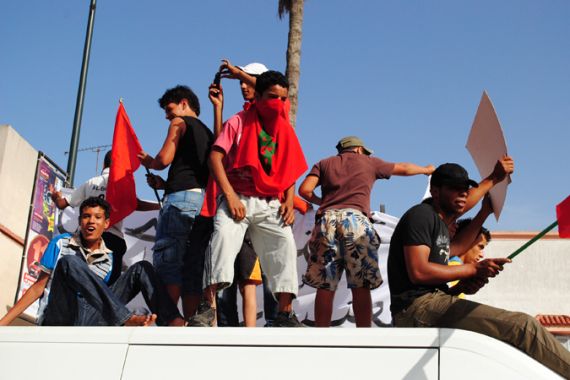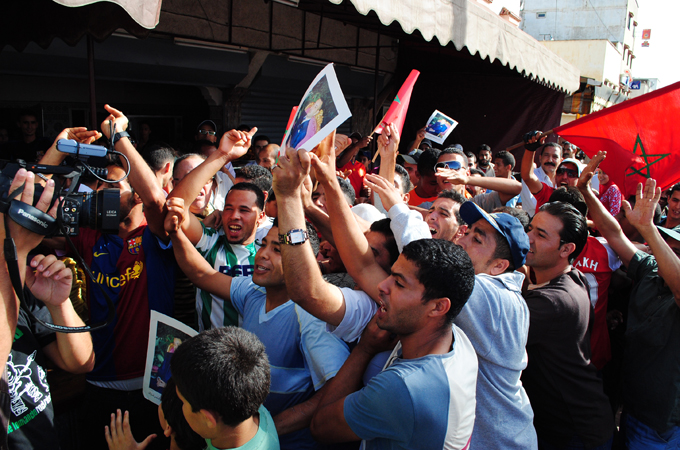Democracy protesters face violence in Morocco
Despite promising constitutional reforms, protesters in Rabat were prevented from gathering by supporters of the king.

 |
| Supporters of Muhammad VI show their strength of feeling in front of a camera filming their rally in Rabat. The king has reserved the right to appoint the government, dissolve parliament, and levy emergency powers [Photo: Francesco La Pia] |
Police and pro-monarchy demonstrators violently snuffed out a February 20 Movement protest in Rabat on Sunday evening, chasing protesters from the Hay Taqqadum neighbourhood where the mobilisation had begun to gather. This came just days after King Muhammad VI heralded his proposed constitutional reforms as a “watershed event” for building a more open and democratic society.
The February 20 movement called for nationwide protests in response to the king’s proposed constitutional changes, unveiled Friday night, which critics charge do not meaningfully loosen his grip on power. Recent weeks have seen mass protests throughout Morocco in response to escalating repression of demonstrations and the death of protester Kamel Amari at police hands earlier this month.
Shortly before the Rabat protests were set to begin, monarchists paraded through the Hay Taqqadum district, with hundreds waving Moroccan flags, holding portraits of the king, while chanting: “The people say ‘Yes’ to the constitution.” Scores of people piled onto trucks bearing large sound systems as they drove in circles, chanting and cheering.
‘We are with the king’
When February 20 movement protesters showed up at the scheduled time, police forcibly blocked them from amassing, swiftly forming lines to cut them off from each other and chasing them through the streets. A flurry of activity broke out, as the king’s supporters began attacking protesters, in some cases throwing eggs and rocks as they pursued them.
Protesters say that people were paid to come out and rally in support of the constitutional changes. “These people are like the Egyptian baltagiya,” said Mehdi, a member of the February 20 Movement, in reference to those paid by the former Egyptian government who infamously beat participants in Cairo’s recent uprising.
At times, the police appeared to attempt to restrain the king’s supporters from attacking protesters. At others, however, the police played a direct role in beating protesters and chasing them from the scene. While journalists were allowed by police to roam freely within the monarchists’ rally, they were violently dispersed when documenting the February 20 Movement presence. “We are here because we are with the king,” said a man rallying with the king’s supporters, identifying himself as Yusef. “The king has always been in favour of reforms. Now those reforms will be more clear and democracy will be stronger. It is also significant that he plans to make Amazigh an official language.” Amazigh is the language of Morocco’s Berber population, estimated to comprise 60 per cent of Morocco’s population.
The king’s power
|
|
Yet February 20 Movement protesters say the reforms are superficial, leaving true power consolidated in the hands of the king. “Where is democracy, when the king tells you to vote yes to the constitution and won’t even let you assemble to express your concerns?” asked Abdilah, a protester and Rabat resident. “We want real freedom and real democracy.”
Muhammad VI, who has ruled since 1999, keeps a tight grip on power, maintaining the right to appoint the prime minister and cabinet members, dissolve parliament, and levy emergency powers. He also sits at the head of the country’s religious institutions. The proposed constitution keeps the king firmly in control of Morocco’s military and security organisations, while declaring that his person shall be “inviolable” and “respect and reverence shall be due to him as King, Commander of the Faithful and Head of State”. Under the proposed changes, the king is declared supreme religious authority in the country, although he claimed in his Friday speech that he will embrace freedom of religion.
The changes expand the power of the prime minister, allowing him to appoint and dismiss cabinet members. Yet the king maintains the power to appoint the prime minister, although he must now select from the party that gets the most votes.
The changes also require the king to confer with the prime minister and constitutional court before dissolving parliament and stipulates that the prime minister also holds that right. Yet, given his role in appointing the prime minister and half of the constitutional court, this stipulation will do little to limit his actual powers to dissolve parliament.
Furthermore, the king declared that the new constitution would create an autonomous judiciary branch. In the same breath, he declared that he remains the guarantor of all sentences.
New constitution and reforms
|
|
The king has been reviewing the constitution for months behind closed doors, as protests swept the country. While the new charter committee consulted with some unions and political parties, the text itself was not drafted by democratically elected officials, and the Moroccan public had been left in the dark about what the changes would actually be.
The proposed reforms were a concession to the protest movement who took to the streets on February 20th, as uprisings and revolts spread through North Africa and the Middle East. The protesters – comprising a broad coalition calling for reform, democracy, and an end to poverty and unemployment – have taken to the streets regularly and do not seem to be losing steam. “Thousands marched in Casablanca,” said protester Brahim. “First there was a February 20 Movement protest to say that this constitution was not enough for us. There is some change but it is not what we hope to achieve. After we started to protest, the king’s supporters showed up and attempted to bother us. But we outnumbered them, and eventually they went away.”
“Bin Ali spoke of reform. So did Mubarak. And today Assad joined the chorus,” says Larbi Sadiki, senior lecturer in Middle East Politics at the University of Exeter.
Sadiki continued:
| It is not a failure to promise reform. It is a failure to do so for the wrong reason: absorbing public dissent, co-opting soft liberalisers who favour gradual reform no matter how patchy or superficial, and, obviously, buying time. Moreover, kings and presidents now are no longer in a position to dictate the substance or timetable for reform. The give-away mentality of absolute rulers no longer con the Arab masses. The people and democratic and representative channels and forums must be the ones entrusted with reform. |
“The king’s supporters say that the people want the new constitution,” said Abdollah, another February 20th Movement protester. “But where are the people? Are they letting the people speak?”
